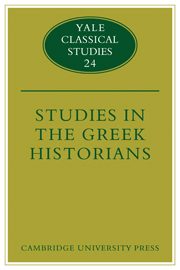Book contents
- Frontmatter
- Contents
- Preface
- In Memoriam Adam and Anne Parry
- Learning through suffering? Croesus' conversations in the history of Herodotus
- An Athenian generation gap
- Thucydides' judgment of Periclean strategy
- The speeches in Thucydides and the Mytilene debate
- Xenophon, Diodorus and the year 379/378 B.C. Reconstruction and reappraisal
- Aristotle's Athenaion Politeia and the establishment of the Thirty Tyrants
- Nearchus the Cretan
- Myth and archaeologia in Italy and Sicily – Timaeus and his predecessors
- Symploke: its role in Polybius' Histories
- Plutarch and the Megarian decree
- Herodian and Elagabalus
Myth and archaeologia in Italy and Sicily – Timaeus and his predecessors
Published online by Cambridge University Press: 06 December 2010
- Frontmatter
- Contents
- Preface
- In Memoriam Adam and Anne Parry
- Learning through suffering? Croesus' conversations in the history of Herodotus
- An Athenian generation gap
- Thucydides' judgment of Periclean strategy
- The speeches in Thucydides and the Mytilene debate
- Xenophon, Diodorus and the year 379/378 B.C. Reconstruction and reappraisal
- Aristotle's Athenaion Politeia and the establishment of the Thirty Tyrants
- Nearchus the Cretan
- Myth and archaeologia in Italy and Sicily – Timaeus and his predecessors
- Symploke: its role in Polybius' Histories
- Plutarch and the Megarian decree
- Herodian and Elagabalus
Summary
Thucydides gives only a very brief account of early Sicilian history, so that we remain uncertain how accurate and well-founded his chronological details are and how much more he could have told us if he had wished to do so. Without any doubt he could have told some interesting things about Hiero and his contemporaries, if he had thought it relevant to his theme. But could he have added much to his summary account of the colonial settlements or given any substantial history of the development of these colonies in the seventh and sixth centuries? If he had made inquiries, in the Herodotean manner, in Syracuse or Gela or Acragas, or in Taras or Posidonia (it seems anachronistic to use the Latin names), would people have been able to provide him with the same generous measure of local history and myth and τὸμυθῶδες that he could have collected in Thebes or Argos, Miletus or Samos? It might be easier to answer the question if we had some of the text of Antiochus of Syracuse or Hippys of Rhegium, or more substantial portions of the poetry of Stesichorus. But as things are, we can only wonder if Greeks in Italy and Sicily knew much more about their early history than we do.
It has always been convenient to suppose that Thucydides had read the history of Antiochus.
- Type
- Chapter
- Information
- Studies in the Greek Historians , pp. 171 - 196Publisher: Cambridge University PressPrint publication year: 1975



